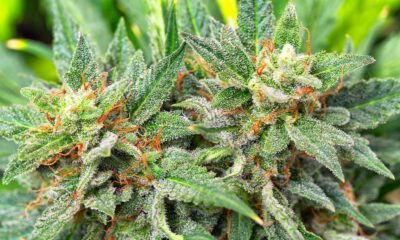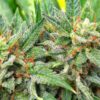
Joint Opinions
Dispelling the Gateway Drug Myth
Instead of acting as a gateway drug, cannabis is proving to be an effective exit strategy for people suffering from opioid addiction.
Since the days of “Reefer Madness” – when marijuana was commonly referred to as “The Real Public Enemy Number One” – opponents of cannabis use have tried to position it as a dangerous doorway leading directly to the abuse of hard drugs like heroin.
How ironic, then, that more up-to-date research has found the reverse to be true.
The reality is that states with legal marijuana programs are reporting fewer deaths from opioid overdoses as well as a drop in Medicare prescriptions, a reduction in opioid-related prescriptions and, particularly for drivers aged 21-40, a reduction in opioid-related vehicular accidents.
The National Academy of Sciences has found “conclusive or substantial” evidence that medical cannabis is effective for the treatment of chronic pain, nausea from chemotherapy and spasticity from multiple sclerosis. These findings were borne out by the Center for Medicinal Cannabis Research at UC San Diego, which found cannabis to be effective in reducing pain in six out of six human studies.
“Cannabis was especially effective in the treatment of chronic neuropathic pain, a type of pain for which opioids are often useless, highly addictive, and widely overprescribed,” stated Dr. Suzanne Sisley, M.D., a physician and renowned researcher in the field of medical marijuana, in reaction to the findings.
The National Institute on Drug Abuse says it straightforwardly: “The majority of people who use marijuana do not go on to use other, ‘harder’ substances.” And a November 2016 study concluded that medical marijuana laws are “associated with reductions in opioid positivity among 21- to 40-year-old fatally injured drivers.”
Meanwhile the more likely candidates for the title of “Real Public Enemy Number One” – prescription opioids – have been identified definitively as the real gateway drugs to heroin.
According to a 2016 report by the American Society of Addiction Medicine – the country’s leading addiction organization, comprising more than 4,000 physicians – four out of five heroin users reported that they started out using prescription painkillers, many of them prescribed by their doctors. Additionally, 94 percent of respondents in a 2014 survey of people in treatment for opioid addiction said they chose to use heroin because prescription opioids were “far more expensive and harder to obtain.”
Heroin is an opiate, a natural painkiller derived from the opium poppy, as are morphine and codeine. They are in the same class of drugs that brings us synthetic or partially synthesized opioid painkillers such as oxycodone (OxyContin), hydrocodone (Vicodin), fentanyl and carfentanil, all of which have been identified as overprescribed in the United States, which now finds itself in the throes of an opioid epidemic.
The Centers for Disease Control and Prevention reports that since 1999, “the amount of prescription drugs prescribed and sold in the United States has nearly quadrupled,” and currently, an average of 91 people die daily from an opioid overdose, while more than 1,000 people a day visit the ER for misuse of prescription opioids.
But since 2014, we’ve known that deaths from opioid overdoses fell by 25 percent in the states that legalized medical marijuana (21 states at the time; that number is now 29). Dr. Marcus Bachhuber, the professor at New York’s Albert Einstein College of Medicine and Montefiore Medical Center who oversaw the study, told Reuters that he now offers cannabis products as part of a “menu of options” for his patients who suffer chronic neuropathic pain and pain from HIV/AIDS.
In the interview with Reuters, Bachhuber referenced the recent data compiled by the National Academies of Sciences, Engineering, and Medicine pointing to the therapeutic effects of cannabis for a wide variety of health issues, including certain cancers, mental health disorders and chronic pain.
In addition, a study released in the July 2016 issue of Health Affairs reveals that doctors in medical marijuana states prescribed 1,800 fewer painkiller prescriptions for patients, per doctor, annually.
What’s hampering further research is, of course, that federal law, circa 1970, still lumps cannabis in with heroin as a Schedule I drug, and refutes its medicinal value – which means doctors can recommend it but not prescribe it.
Sen. Elizabeth Warren hopes to change that. The Democrat from Massachusetts – where the opioid-related death rate has surpassed the national average – has formally approached the CDC to ask the agency to look into the potential of medical marijuana as a non-opioid pain-relief option, as well as to dig into how the legalization of medical and recreational marijuana has impacted opioid use and overdoses.
Because there are still so few peer-reviewed studies on the effects of cannabis, scientists have been forced to form hypotheses based almost solely on real-world data, according to Leo Beletsky, a drug policy expert and professor of law and health sciences at Northeastern University.
“Most of the research that we have on the impact of cannabis in the pain and chronic pain world is from these kinds of observational research,” Beletsky told Leafly.
But that’s about to change: The National Institutes of Health recently awarded a $3.8 million grant to Einstein and Montefiore for the first federally funded, long-term study on the effect of marijuana on opioid addiction. This long-overdue project will follow adults experiencing chronic pain for five years to determine whether medical marijuana reduces their opioid use.
Dr. Chinazo Cunningham, associate chief of general internal medicine at Einstein and Montefiore and principal investigator on the grant, told cannabis-news site Smell The Truth that “we hope to provide evidence-based recommendations that will help shape responsible and effective healthcare practices and public policies.”
That means it just might be time to say goodbye to those “Reefer Madness”-era marijuana misconceptions — and don’t let the gateway door hit you on your way out.
TELL US, do you think cannabis can play a role in quelling opiate addiction?


























